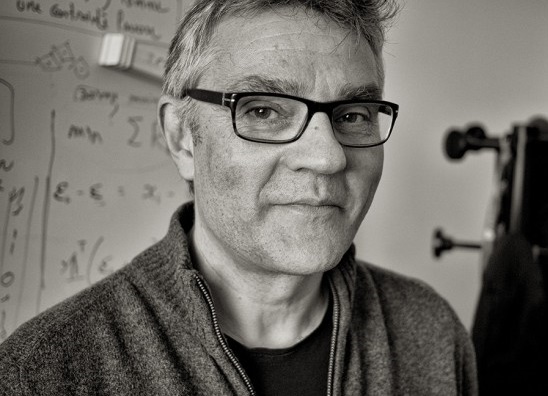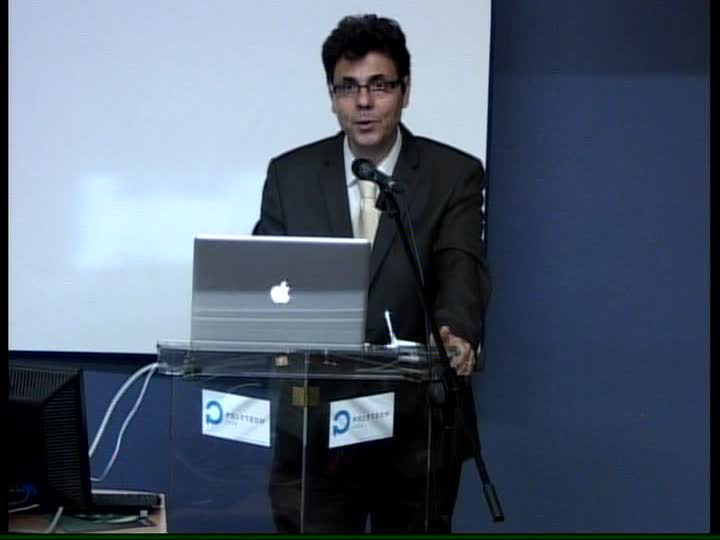Keynote 1: What are the evolutions of diagnostics and maintenance approaches for the Cyber Physical (Production) Systems in the context of Industry of the Future?
Next generation of industry such as those promoted by “Industry of the Future”, “Industry 4.0.” paradigm, holds the promise of increased flexibility/adaptability in production (e.g. manufacturing) to cope with the challenges of producing individualised products as expected by customers with a short lead-time to market and at the cost of mass production.
These challenges can only be met by further developing the digitalisation of production systems (integration of physical and IT-based digital worlds) as defended by new manufacturing concepts, such as “Biologicalisation in Manufacturing” or “Cloud Manufacturing” in which data science, smart manufacturing objects (SMO) and services are predominant.
This vision should increase global competitiveness by promoting innovative business models mainly driven by servitization (anything-as-a-service) and stakeholders’ collaboration in the way to keep industrial employment in Europe.
It led to the introduction of new technologies/techniques like IoT, advanced ICT, Big Data Analytics (BDA), cloud computing and Cyber-Physical Production System (CPPS).
More precisely CPPS is a new way to organise the system (heterarchical vs holistic approach) to enable fast integration feedback and control loops throughout distributed manufacturing infrastructures all along its life cycle. So, the resulting organisation is assimilated to a complex manufacturing ecosystem based on interaction of humans, objects (e.g. products, components), customers, society partners … having to offer a dynamic, real-time optimized and self-organizing value chain.
These advanced characteristics imply that the system in support of the value chain need to become more adaptable, agile, robust, resilient … to face fault, unforeseen events while guaranteeing system performance. However, the process of predicting reliability and performance in such context is far from trivial. The main barriers include, at least, the inability to anticipateunknown faults particularly for complex systems, the inability to sustain system functionality and performancein the presence of system anomalies and severedisturbances and the inability to self-adjust system configurations to mitigate internal faults or external intrusions to achieve survivability.To face these barriers, the conventional challenges on diagnostics, prognostics, Fault-Tolerant Control, Maintenance … should be extending, mainly by using Artificial Intelligent tools to construct concepts such self-healing, self-assessment, self-maintenance, self-repair … as promoted by the Prognostics and Health Management (PHM) community.
Thus, the goal of this keynote speech is to provide insights into various aspects of these new concepts within the frame of “Industry of the Future”/CPPS and to discuss directions for future research on these concepts.
.

Prof. Benoît IUNG, University of Lorraine-France
Benoît IUNG was born in 1962 in Nancy, France. He is full Professor of Prognostics and Health Management (PHM) at Lorraine University (France). He conducts research at the Nancy Research Centre for Automatic Control (CRAN, CNRS affiliation, UMR7039) where he is co-managing today a research group on Sustainable Industrial System Engineering (about 55 people). His research and teaching areas are related to dependability, advanced maintenance engineering, prognostics, heath management, e-maintenance and cyber-physical production system (CPPS). In relation to these topics he took scientific responsibility for the participation of CRAN in a lot of national, European (i.e. REMAFEX, DYNAMITE) and international projects, for example, with China (i.e. EIAM-IPE, CENNET) and Chile (i.e. iMaPla). He has numerous collaborations with industry in the frame of Convention for Research Program (mainly in France with EDF, CEA, RENAULT) and serve as responsible of a common Lab called PHM-FACTORY with PREDICT SME (ANR LabCOM). He is the chairman of the IFAC TC5.1. (2017-2020).
He was until 2014 the chairman of the IFAC WG A-MEST on advanced maintenance, and until 2018, the chairman of the ESRA TC on Manufacturing. He is a CIRP fellow since 2017, a PHM Society Fellow from 2018, a founding Fellow of ISEAM and of the European IAM Academic and Research Network, a nominated member of the IFAC TC 5.3. He had also a guest position in the NSF industry/university cooperative research centre for intelligent maintenance system (Univ. of Cincinnati; Pr. J. Lee, until end of 2017). He serves as correspondent on “Factory of the Future” for the University of Lorraine since 2016.
Benoît Iung has (co)-authored over 200 scientific papers (65 journal papers) and several books including the first e-maintenance book in Springer.
He developed several keynote speeches in international conferences and attended as reviewer, faculty opponent or examiner for a lot of Ph. D. and “docent” defenses in France and in Europe (UK, Belgium, Netherlands, Norway, Spain, Sweden, and Italy). He has supervised until now 18 Ph. D. Students and more 25 MA.
He served as IPC member of various IEEE and IFAC conferences and developed expertise/reviewing for European Commission in the frame of H2020 from 2015. He is a senior Editor of the new IFAC Journal of System and Control (Elsevier). Since 2014, he is the treasurer of the IEEE Reliability French chapter.
Benoît IUNG received his B.S., M.S. and Ph.D. in Automatic Control, Manufacturing Engineering and Automation Engineering, respectively, from Lorraine University, and an accreditation to be research supervisor (2002) from this same University.
Keynote 2: Deep learning for reliability, Diagnosis and predictive maintenance
Security and cost reduction imperatives are increasingly driving industries towards conditional predictive maintenance.
It is made possible by acquisition of many data related to the integration of different sensors within the systems. The areas of statistical learning in general and deep learning in particular are now sufficiently mature to allow the development of technologies with artificial intelligence that can better anticipate technical failures than humans.
This is true provided you have enough data to program it.
This talk will introduce the principles of deep learning and show how to use it for diagnosis (static and dynamic), to manage multimodality, detection of change, outliers, and weak signals analysis.

Prof. Stephane Canu, INSA Rouan-France
Stéphane Canu is a Professor of the LITIS research laboratory and of the information technology department, at the National institute of applied science in Rouen, Normandy.
He has been the dean of the computer engineering department he create in 1998 until 2002 when he was named director of the computing service and facilities unit.
In 2004 he join for one sabbatical year the machine learning group at ANU/NICTA (Canberra) with Alex Smola and Bob Williamson. In the last five years, he has published approximately thirty papers in refereed conference proceedings or journals in the areas of theory, algorithms and applications using kernel machines and deep learning.
His research interests includes deep learning, kernels machines, regularization, variable selection and optimization in machine learning.
Keynote 3: Hybrid Bond Graphs for Supervision of Renewable Energy Systems : Application to Power to X Technologies.
The Power-to-X (P2X) technology referring to a number of electricity conversion and energy storage is an innovative approach and can be used to address the intermittency of renewable
energy sources, such as wind and solar, and to balance network loads during average and peak electricity demand. Moreover, it has a real potential to contribute not only regarding reduction of
greenhouse but also utilization of surplus energy across different industries.
From a practical point of view, the objective of the plenary speech is to present an industrial methodology for implementation of Power-to-X technologies by developing innovative indirect of
electricity to fuels (hydrogen) from green sources and direct conversion of electricity with CO2 to platform chemicals developed in the framework of an European project.
From fundamental academic side, supervision (in terms of diagnosis and optimal operating modes management) of such process is complex because of its hybrid aspect due of interconnection
between different varieties of sources and storage units, where each or some can be connected and disconnected, leading to a dual discrete-continuous dynamical behavior.
The present speech concerns those two complementary problematics to be discussed (i) state of art and problematics of P2X technologies based on real industrial (ii) literature synthesis of
supervision of Hybrid Dynamic Systems(HDS) and use of new formalism named Even Driven Hybrid Bond Graph (EDHBG) for online supervision of Hybrid Renewable Energy Systems HRES applied to a real multisource platform submitted to intermittent sources.

Prof. Belkacem OULD BOUAMAMA, Polytechnique of Lille-France
Belkacem OULD BOUAMAMA is full Professor, and head of international relations and research at « Ecole Polytechnique Universitaire de Lille, France) » He is the leader of Bond Graph group at
the CRIStAL (Research center in Computer Science, Signal and Automatic Control of Lille), Laboratory of the National Center for Scientific Research, where his activities concern Integrated
Design for Supervision of System Engineering.
Their application domains are mainly ITS, nuclear, energy, and mechatronic systems. He is the author or coauthor of over 100 international
publications in this domain and co-author of four books in Fault Detection and Isolation, mechatronics, bond graph modeling and Intelligent Transportation Systems.
Keynote 4: Advances of Cyber-Physical Control in Medical and Industrial Applications
Cyber-physical Control is a relatively new conceptual view of thinking that considers the problems of system control at different levels from the fundamental physical interactions up to the organization of large-scale complex systems. Besides the layered distinction of varying complexities, CPC investigates the overlaps and vertical cross effects between the layers.
At the University Research and Innovation Center of Obuda University (URIC), we are facing various aspects of CPC in systems and control science, industrial and medical robotics as well as in biological control problems.
In this lecture, three topics of our teams will be touched. First, the latest results of the "Tamed Cancer" project will be discussed that addresses the cancer therapy using the methods of model-based robust and optimal control. The primary goal of this project is the development of personalized automatic drug administration to suppress the growth of the vascular system of early-phase cancer.
The second topic is about the recent advances of autonomous robotic surgery. Similarly to the efforts put in autonomous driving, automation of surgery is an ambitious desire too that certainly will be a game changer. Our team develops a software framework based on the da Vinci Research Kit that handles the so-called surgical primitives autonomously with the supervision of the surgeon.
Last but not least, I introduce a monitoring and anomaly detection method for collaborative robot applications. Based on the well-known One Class SVM algorithm we classify the actual parameter vector recorded from the plant if it belongs to the already learned normal states or represents something new, possibly an anomaly. This approach fits well to the Industry 4.0 concepts and the related data-oriented manufacturing control.
These three topics present a representative cross-section about the essence of Cyber-Physical Control also revealing the core activities of URIC.

Prof. Dr. Imre J. Rudas, Óbuda University-Hungary
Imre J. Rudas graduated from BánkiDonát Polytechnic, Budapest in 1971, received the Master Degree in Mathematics from the EötvösLorándUniversity, Budapest, the Ph.D. in Robotics from the HungarianAcademy of Sciences in 1987, while the Doctor of Science degree from the HungarianAcademy of Sciences in 2004. He received Doctor Honoris Causa degree from the Technical University of Košice, Slovakia,from “Polytechnica” University of Timisoara, Romania, from Óbuda University, and from Slovak University of Technology in Bratislava. He was awarded by the Honorary Professor title in 2013and Ambassador title in 2015 by Wroclaw University of Technology.
He is active as a full university professor and the Head of the Steering Committee of the University Research, Innovation and Service Center.
He served as the Rector of Budapest Tech from 2003 till 2010. He was the founderof Óbuda University, the successor of Budapest Tech and was elected as the first Rectorin the period 2010-2014. He served as the President of the Hungarian Rector’s Conference and member of European University Association Steering Committee in 2008.
He is a Fellow of IEEE, Senior AdCom member of Industrial Electronics Society (IES),he served IES as a Vice-President in 2000-2001. He was elected as the Vice-President for Membership and Student Activities in IEEE System, Man and Cybernetics Society for the period 2015-2016.He is the Senior Past Chair of IEEE Hungary Section. He was the founder of IEEE SMC Hungary Chapter, IEEE Computational Intelligence Hungary Chapter and IEEE Industrial Electronics and Robotics and Automation Joint Hungary Chapter. He is the President Elect in IEEE systems, Man, and Cybernetics Society.
He reestablished the Hungarian Fuzzy Association in 1997 and had served as the President in the period 1997 – 2007. Since 2007 he is the Honorary President of the Association. He had been IFSA Council member from 1997 till 2013.
He served IFSA as a Vice President in the periods 2005-2007 and 2007-2009. He had been the treasurer of IFSA from 2009 till 2013.
He had been the Vice-President of the Hungarian Academy of Engineers for four years.
He serves as an associate editor of some scientific journals, including IEEE Transactions on Industrial Electronics, member of editorial board of Journal of Advanced Computational Intelligence, Editor-in-Chief of ActaPolytechnicaHungarica, member of various national and international scientific committees. He is the founder and organizer of the IEEE International Conference Series on Intelligent Engineering Systems (INES) since 1997, IEEE International Conference on Computational Cybernetics (ICCC),IEEE International Symposium on Computational Intelligence and Informatics (CINTI, since 2000), IEEE International Symposium on Machine Intelligence and Informatics (SAMI, since 2003), IEEE International Symposium on Intelligent Systems and Informatics (SISY, since 2003), IEEE International Symposium on Applied Computational Intelligence and Informatics (SACI, since 2004), IEEE International Symposium on Logistics and Industrial Informatics (LINDI, since 2007). He has served as General Chair and Program Chair of numerous scientific international conferences.
He received many awards, among others the Denes Gábor award in 2006, John von Neumann Award in 2006, Hungarian Order of Merit in 2009 and Pro Óbuda award in 2014.
His present areas of research activities are Computational Cybernetics, Soft Computing, Fuzzy Control and Fuzzy Sets, Robotics, Cloud Robotics, Internet of Anything, He has edited and/or published 22three books, published more than 800 papers in international scientific journal, conference proceedings and book chapters, and received more than 3500citations.